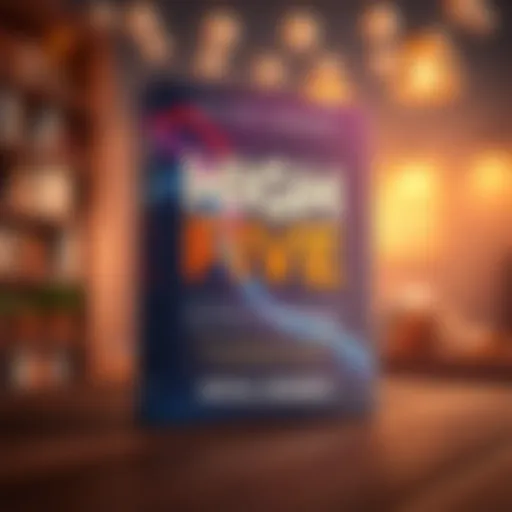Exploring Life-Changing Literature: Key Insights


Intro
Literature has an extraordinary capacity to shape our worldviews, spark imagination, and drive personal metamorphosis. From Shakespeare's existential musings to Toni Morrison’s powerful narratives on identity, the written word becomes a vessel through which readers embark on profound journeys. These works don’t just entertain; they nudge us to reflect on our beliefs, confront our fears, and embrace the complexities of human experience. In a world overflowing with information, discovering literature that genuinely transforms one’s existence is akin to finding a needle in a haystack. This exploration aims to dissect the essential themes and pivotal texts that can light our paths toward personal development and cognitive awakening.
Key Concepts and Insights
Main Ideas from the Book
In examining the essence of influential literature, certain key concepts emerge consistently. These texts often grapple with existential questions, societal norms, or the nature of human relationships. For instance, George Orwell's 1984 serves as a cautionary tale, peeling back the layers of totalitarianism and propelling readers into discussions about freedom and autonomy. Similarly, in The Alchemist by Paulo Coelho, the pursuit of one’s personal legend invites an exploration of destiny and self-discovery.
These central ideas resonate differently with each reader, depending on their own life experiences and contexts. The capacity for literature to widen perspectives is not merely about dialogue; it’s about connecting the dots within the vast mosaic of human experience.
Practical Applications of Concepts
Gleaning insights from literature also has practical applications in everyday life. Here are a few ways in which powerful literary themes can enrich personal growth:
- Critical Thinking: Engaging with complex characters and intricate plots encourages analytical skills. Readers learn to dissect motivations and moral dilemmas.
- Emotional Intelligence: Literature often delves into the psyche of its characters, fostering empathy by compelling readers to inhabit perspectives vastly different from their own.
- Self-Reflection: Characters often reflect our internal struggles. Identifying with them can lead to personal revelations and emotional growth.
"Literature is the most agreeable way of ignoring life" – Fernando Pessoa. This underscores literature's role in both confronting and escaping reality in thought-provoking ways.
Recommendations and Further Reading
Related Books to Explore
For readers eager to delve deeper into transformative literature, the following books provide a variety of lenses through which life lessons can be explored:
- Man's Search for Meaning by Viktor E. Frankl – A poignant reflection on finding purpose even in the most harrowing circumstances.
- Pride and Prejudice by Jane Austen – A classic that delves into societal structure and personal growth through love and misunderstanding.
- The Power of Habit by Charles Duhigg – Although more modern, this non-fiction work explores the habits that define our lives and how changing them can lead to profound transformation.
Additional Resources for Personal Development
In addition to literature, other resources can complement one’s journey toward self-discovery. Here are a few:
- Educational websites like Britannica offer vast articles on key literary works and their impacts.
- Online forums, such as Reddit, can provide community discussions about personal growth through reading.
- Podcasts that focus on author interviews and literary themes can enhance understanding and offer different interpretations of texts.
Prelude to Life-Changing Literature
In today’s fast-paced world, the power of literature often goes unappreciated. However, life-changing literature serves as a direct pathway to personal growth and self-reflection. These are not just stories, but vessels of wisdom that hold the potential to transform lives. Through carefully crafted narratives, authors provide insights that resonate with readers on a deep, personal level.
Life-changing literature can evoke a sense of connection and understanding that taps into universal human experiences. By engaging with various perspectives, readers can broaden their own outlooks on life. This rich fabric of stories illustrates a myriad of themes such as resilience, purpose, and the complexity of the human condition.
Moreover, these texts often explore profound emotions, challenge our beliefs, and push us to reconsider our values. Through story arcs, readers embark on their own journeys of discovery and introspection. It’s not merely about reading; rather, it’s about engaging with the text in a way that can spark meaningful change.
Consider this: when one confronts their struggles through the lens of a compelling narrative, the process of self-exploration is initiated. It's akin to looking into a mirror that reflects not only one's virtues but also imperfections. Such reflections can lead to actionable insights. Hence, dealing with challenging topics through literature becomes greatly beneficial.
While the significance of these works cannot be overstated, it’s essential to approach them thoughtfully. Not every book is destined to leave an indelible mark on every reader, which underlines the need for discerning choices. Selecting literature that resonates personally is key.
Additionally, discussions about these texts can deepen understanding, whether through book clubs or academic settings. They provide opportunities for dialogue, enabling readers to confront and grapple with themes that may feel uncomfortable yet vital.
Overall, life-changing literature is an invitation to explore the depths of human experience—one that offers insights into our own lives, compelling us to grow and evolve through the power of words.
The Importance of Book Summaries
Book summaries play a pivotal role in facilitating access to literature that can transform lives. In a world where time is a precious commodity, reading every word of a book can feel like climbing a mountain without a map. Here, summaries act as guiding stars, directing readers toward the core ideas and themes without wading through pages of extraneous text. This process doesn’t merely save time; it encourages exploration. When people encounter a concise summary, they often feel compelled to delve deeper into the full text, eager to absorb all the nuances.
Additionally, book summaries serve as excellent entry points for those who might feel intimidated by certain genres or literary styles. Potential readers, especially students or busy professionals, can gauge whether the material resonates with them based on a concise overview.
Facilitating Access to Knowledge
One might say that knowledge is power, and book summaries give readers the keys to unlock that power. These summaries provide a distilled version of substantial literature, encapsulating vital lessons that might otherwise be missed in a full reading. For instance, consider a complex work like "War and Peace" by Leo Tolstoy. Reading the full text demands significant time and mental engagement, yet a well-crafted summary encapsulates the major conflicts, themes, and character arcs, making it accessible to those with limited time or attention span.
The democratization of literature is another important aspect of this facilitation. Language barriers, for example, can hinder access to transformative ideas found in books written in different tongues. Summaries can be translated or simplified, allowing a broader audience to engage with essential content. In diverse environments like schools or workplaces, these brief recaps enhance conversations and discussions, allowing individuals from varying backgrounds to share perspectives based on shared knowledge.
Enhancing Retention and Understanding
Understanding literature involves more than just reading; it entails digesting and retaining the ideas conveyed within. Book summaries provide a solid foundation for this process. They consolidate intricate themes and pivotal arguments into manageable chunks, which can improve comprehension. Rather than grappling with complex terminology and convoluted prose, readers can grasp key concepts swiftly. This is crucial for academic settings where discussions often hinge on a shared understanding of the texts being studied.
Moreover, studies have shown that summarizing material enhances retention. When readers engage with a summary, they mentally process the information, leading to stronger memory formation. Each time a person revisits that summary, it can trigger recall of details from the full text. This is particularly beneficial for graduate students or professionals preparing for legal or medical exams, where grasping the essential aspects of literature is critical.
"A summary can turn a mountain into a molehill, transforming something daunting into something achievable."
Categories of Life-Changing Books
Understanding the categories of life-changing literature is pivotal for readers who are on the quest for personal growth and knowledge. These categories not only aid in organizing thoughts but also empower readers to navigate through vast literary landscapes. The tokies that one might find in these sections often connect deeply to our daily lives and experiences, resonating with varied audiences across different backgrounds. Each category holds the potential to guide individuals through transformative journeys, addressing their distinct needs, desires, and aspirations.
Self-Help and Motivation


Self-help books often serve as the initial step for many on their path to self-discovery. These works are akin to having a trusted friend who offers tough love, pushing you to confront your flaws while highlighting your strengths. Authors, such as Brené Brown and Tony Robbins, create actionable frameworks that not only inspire but also equip readers with concrete strategies for self-improvement.
The beauty of this category lies in its accessibility. Most readers find themselves yearning for insight on topics like resilience, goal-setting, and emotional intelligence at different life stages. They provide a tangible path towards betterment, turning aspirations into achievable milestones.
In the grander scheme, self-help literature acts as a mirror—a reflection of our innermost thoughts and feelings. Like a guiding star, these texts provide clarity in times of chaos or self-doubt, igniting the spark for change.
Business and Leadership
The realm of business literature transcends mere profit margins. It delves into the heart of what makes a true leader. Think of authors like Simon Sinek and Jim Collins who invite readers to ponder the why behind their actions, framing leaders as influencers rather than just decision-makers. The narratives woven in these works often blend strategic insights with human experience, offering readers a deeper understanding of ethical leadership and innovative thinking.
Moreover, books in this category subtly reflect the era's pulse. They tackle relevant issues, from workplace diversity to sustainable practices, reinforcing the idea that informed leadership is a responsibility rather than a privilege. Here, readers embark on a journey that can reshape their corporate practices and elevate team dynamics, urging them to consider broader implications of their decisions.
Philosophy and Ethics
Philosophy and ethics often provide the bedrock upon which both self-help and business choices rely. These texts challenge us to grapple with profound questions: What is justice? What does it mean to live a good life? Authors like Viktor Frankl and Albert Camus guide readers through reflections on existence, freedom, and moral responsibility.
The significance of this category cannot be overstated. Engaging with philosophical literature encourages critical thinking and self-assessment. It provides a framework for readers to navigate their moral dilemmas while equipping them with perspectives that have stood the test of time. Literature in this vein emphasizes that every decision carries ethical weight and invites individuals to contemplate the consequential nature of their choices.
Spirituality and Mindfulness
In an era marked by constant distractions, spirituality and mindfulness literature emerge as essential companions on our quests for inner peace. Works like “The Power of Now” by Eckhart Tolle or “The Four Agreements” by Don Miguel Ruiz resonate with readers eager to cultivate awareness and intentionality in each moment.
Both categories weave through a rich tapestry of practices, offering guidance on meditation, breathing techniques, and the art of being present. These texts are not mere prescriptive guides; they invite readers to explore their spirituality, nurturing a connection to something greater than themselves. Here, literature oftentimes becomes a bridge—connecting the individual with the collective human experience.
As one engages with spirituality and mindfulness, the reader discovers that the most impactful change often begins from within. This inner transformation then ripples outward, influencing all areas of life.
"Books can be a friend, a guide, and a teacher; they can lead us to ourselves and show us glimpses of what it means to be human."
In summary, the categories of life-changing literature open doors to diverse realms of understanding. Each category serves a unique purpose, collectively forming a foundational library that encourages growth, introspection, and transformation. Through these texts, readers can navigate their journeys with clarity, purpose, and understanding, leading to a more enriched existence.
Highlighting Influential Authors
Focusing on the contributions of influential authors is crucial in understanding the vast landscape of life-changing literature. These writers often serve as the architects of thought that can shift paradigms and provoke deep introspection. They craft narratives that not only reflect society but also challenge its norms, pushing readers to explore new ideas and perspectives. By examining these authors and their works, we can discover the profound ways in which literature shapes personal and collective experiences.
Classic Authors and Their Impact
Classic authors like Leo Tolstoy and Jane Austen left indelible marks on the world of literature and thought. Tolstoy's "War and Peace" paints a sweeping mural of society, intricately weaving together the fates of characters against the backdrop of history. Readers don’t just visit 19th-century Russia; they become entwined in the moral dilemmas and philosophical musings that Tolstoy so eloquently articulates.
Jane Austen, on the other hand, provides keen insights into the societal constraints of her time through novels like "Pride and Prejudice." Her ability to blend wit with critique allows readers to revel in the characters’ journeys while pondering issues of class, gender, and family dynamics. Such classic literature offers not just entertainment but also timeless reflections on the human experience.
The power of classic literature lies in its ability to resonate across time; it's like a bridge connecting generations through shared values and lessons.
Contemporary Voices in Literature
In contrast, contemporary authors bring fresh perspectives and contemporary issues to the forefront of literature. Writers like Chimamanda Ngozi Adichie and Haruki Murakami explore themes of identity, belonging, and the complexities of modern society. Adichie’s "Half of a Yellow Sun" tells of the Biafran War and the social upheaval during that period, shedding light on underrepresented voices in history. Her work invites readers to understand and empathize with the multifaceted narratives that shape our world today.
Similarly, Murakami's novels, such as "Kafka on the Shore," delve into surrealism and magical realism, challenging readers to confront subconscious layers of desire and identity. His narratives often blur the lines between reality and dream, pushing one to think outside conventional boundaries.
Both classic and contemporary authors serve as guiding lights, illuminating the complex structure of human experience through their distinct narratives. Engaging with their works not only fosters greater awareness but also promotes critical thinking, a skill paramount in a world constantly in flux.
Themes in Life-Changing Literature
Exploring themes in life-changing literature is crucial, as these underlying concepts often resonate with readers on a fundamental level. They can shape perspectives, provoke thoughts, and inspire action. When readers delve into these motifs, they connect not just with the characters, but also their own lives, unlocking insights that could well guide them through various challenges.
Resilience and Overcoming Adversity
In many transformative texts, resilience stands out as a cornerstone theme. Characters are frequently faced with situations that would break their spirit; however, their ability to adapt and persevere becomes a powerful narrative device. One can look at the journey of Elizabeth Gilbert in "Eat, Pray, Love." After experiencing a difficult divorce and grappling with loss, her pursuit of self-discovery showcases how battling life's unexpected challenges can lead to profound personal growth.
Resilience isn't just about bouncing back; it’s a deeper lesson about learning from hardship. Through reading, one might glean strategies or shift their mindset toward the obstacles they face in real life. Here, literature acts like a mentor, providing templates of resilience, urging readers to rise above their circumstances, regardless of how dire they might seem.
"What matters most is how well you walk through the fire." – Charles Bukowski
The Quest for Purpose
Another significant theme in life-altering literature is the quest for purpose. This quest often serves as a driving motivation for protagonists; through their journey, readers confront their own notions of meaning and fulfillment. In Viktor Frankl's "Man's Search for Meaning," the author explores how finding purpose can not only sustain individuals during the hardest of times but also guide their choices and actions in life.
Literature often presents various avenues for meaning—career, relationships, spirituality, and creativity. For many, these narratives provide windows through which they can assess their own lives, ultimately igniting the quest for something more profound. Through this lens, the characters’ journeys mirror the readers’ own quest for understanding – a powerful reminder of life's interconnectedness and the human experience.
The Human Condition
The theme of the human condition weaves itself through countless literary works, tackling the essence of what it means to be human. From love and loss to joy and despair, authors explore the full spectrum of human emotions, confronting readers with truths that resonate universally. A fine example is found in Leo Tolstoy’s "Anna Karenina," where the complexities of love and societal norms are laid bare.
Understanding the range of human experiences can enrich a reader's perspective on their own life. Seeing characters face moral dilemmas or existential crises encourages reflection on one's own decisions and relationships. Literature, in this sense, acts as both mirror and lens—allowing readers to gain insight into themselves and the world around them.
In essence, themes in life-changing literature are more than mere narrative devices; they serve as crucial guides in our journey through life’s many ups and downs. The exploration of resilience, the pursuit of purpose, and the examination of the human condition provide pathways to greater self-awareness and empathy in understanding the world.


Character Development in Literature
Character development serves as a cornerstone in literature, breathing life into narratives and allowing readers to connect deeply with the story. When examining life-changing literature, understanding the progression of characters becomes essential. Characters are not mere figments of an author's imagination; they embody human experiences, possibilities, and even flaws. This is where the role of character development shines, guiding readers through nuanced journeys that reflect their own lives.
In literature, character development impacts not just the plot, but also the moral and thematic messages conveyed. Well-crafted characters foster empathy, enabling readers to navigate complex emotions and ethical dilemmas. Engaging with their struggles prepares individuals to face their own challenges, making literature a significant catalyst for personal growth. Moreover, examining character arcs can reveal how society elevates certain traits or philosophies, influencing contemporary culture.
Protagonists and Their Journeys
Protagonists are often the beating heart of a narrative, with their journeys paralleling the reader’s own quest for understanding and purpose. These main characters typically evolve through a series of trials, offering readers a lens to examine their own life choices and experiences. Transformation is key here; protagonists do not simply exist within the story but engage in ongoing struggles that refine their beliefs and motivations.
A notable example is Elizabeth Bennet from "Pride and Prejudice" by Jane Austen. Initially, Elizabeth exhibits prejudices that cloud her judgment, particularly towards Mr. Darcy. As the plot unfolds, her self-reflection and willingness to reconsider her thoughts lead to significant personal growth. This exemplifies how literature's insight into character evolution can inspire readers to embrace humility and challenge their biases.
"A well-developed character acts as a mirror, allowing readers to examine their own flaws and virtues through the lives woven in narratives."
Antagonists as Catalysts for Growth
Interestingly, antagonists play a vital role in character development too. Often perceived solely as obstacles, these characters can serve as catalysts for the protagonists’ growth. Their presence forces main characters to confront their fears, shortcomings, and values, sparking significant changes. Understanding the dynamics between protagonist and antagonist sheds light on the broader themes within a text.
For instance, in "Harry Potter and the Sorcerer's Stone," Lord Voldemort is not just a villain. He challenges Harry to grow stronger and become more resourceful. Each encounter pushes Harry towards maturity and a clearer sense of identity, illustrating that adversity can lead to substantial self-discovery.
In literature, both protagonists and antagonists are essential; they dance in an intricate pattern of conflict and growth. Recognizing this interaction emphasizes the importance of character development in transformative literature and the lessons woven within.
Literary Devices and Techniques
In literature, the use of devices and techniques is vital in conveying themes, enhancing character development, and engaging readers. These methods go beyond mere decoration; they enrich narratives and invite readers to look deeper into the text. When one encounters a well-crafted story, it often leaves a lingering impression, prompting reflection, discussion, and a desire to revisit its pages. This section endeavors to explore two key literary devices — symbolism and narrative structure — that serve as essential tools in shaping life-changing literature.
Symbolism and Its Significance
Symbolism is one of the most profound literary devices used by authors to encapsulate complex ideas and emotions in a singular representation. At its core, a symbol represents something beyond its literal meaning, often evoking deeper meanings and associations. For instance, in George Orwell's "Animal Farm," the farm itself is a symbol of corruption and the complexities of power dynamics that govern societies. Readers are drawn into a seemingly simple story about farm animals, but as they engage with the text, they uncover layers reflecting the political landscape of their own experiences.
The beauty of symbolism lies not only in what it represents but also in how it triggers thought. It encourages readers to form personal connections with the narrative. When an author employs symbols, they enable readers to derive meaning based on their own backgrounds, thus fostering an intimate relationship with the text. The key takeaway is that symbols can serve as bridges, linking characters’ struggles with the readers' own lives, making literature feel relevant and vital.
"In the hands of a gifted writer, a single object can unravel the tapestry of human experience."
Narrative Structure and Perspective
Narrative structure refers to the way a story is organized and unfolds, while perspective defines the viewpoint from which the story is told. These elements significantly influence how readers interpret and engage with a text. A non-linear narrative, for instance, can create suspense and intrigue, leading readers to piece together the story like a puzzle. Consider Haruki Murakami’s "1Q84," where the story’s interwoven timelines and alternating perspectives challenge the reader to actively participate in assembling the narrative.
Moreover, the point of view shapes the emotional depth of a narrative. A first-person perspective offers an intimate look into a character’s thoughts and feelings. It draws readers close, making them privy to the protagonist's innermost secrets and vulnerabilities. On the other hand, a third-person omniscient perspective can provide a broader view of events and characters, offering context that might be missed in a more limited viewpoint.
In sum, both narrative structure and perspective are integral in crafting a compelling story. They dictate not just how events unfold, but also how readers relate to characters and themes. Thus, literature becomes not just a story being told, but an experience that evokes contemplation, emotion, and a deeper understanding of oneself and the world around.
Critical Reception of Transcendent Works
Understanding the critical reception of life-changing literature sheds light on how texts influence and resonate within society. Critical reception encompasses all reactions—both positive and negative—that a piece of literature elicits from readers and critics alike. This discussion emphasizes several key elements: the role of critique in shaping public perception, the validation or rejection of themes presented within the works, and the influence these responses have on future authors and the literary world.
Grappling with literature's critical reception not only aids in appreciating societal attitudes but also immerses readers in a broader context. By analyzing critiques and reviews, one can identify what makes a literary work significant, explore how it engages with cultural dialogues, and understand the nuances that make it memorable.
Reviews and Literary Criticism
Literary criticism takes various forms, from scholarly analyses to informal reader reviews. Both shapes the public's view of a work. Literary reviews in scholarly journals often provide deep dives into a book's themes, character development, and sociocultural implications. In contrast, reader reviews—found on platforms such as Goodreads or even Amazon—often reflect personal experiences, offering a slice of how literature impacts lives on a day-to-day basis.
One notable element to observe is how early reviews can either build momentum for a book or doom it to obscurity. A book may struggle in its initial release but find newfound appreciation years later due to changing societal values or emerging critical discourse. Classic examples include "Moby Dick" by Herman Melville or "The Catcher in the Rye" by J.D. Salinger, both of which faced criticism upon release but are now considered pillars of American literature.
"A book is more than the sum of its words; it is a living dialogue between authors and readers across time."
Cultural and Social Context
Every piece of literature emerges from a particular cultural environment, and understanding this context is essential for grasping the book's significance. Literature not only reflects prevailing social norms but also challenges them. Take, for instance, the works of George Orwell, who, through dystopian narratives like "1984", has critically engaged with historical events and societal fears. His works do not just entertain; they provoke thought about power dynamics and the human experience—concerns that are timeless.
Similarly, literary works often spur movements within society. When Harper Lee's "To Kill a Mockingbird" was published, it set the stage for conversations on race, justice, and morality in the American South. The critical reception of such texts includes discussions on how they have either closed or opened avenues for social change.
Engaging with the overarching cultural discourse enables readers to see themselves in the text, enhancing both relevance and relatability. Moreover, it shows how literature can sometimes serve as a barometer, reflecting how society shapes narratives, ultimately impacting the critical reception of works.
In exploring these facets, one can appreciate how literature becomes a dynamic player in social dialogues. Understanding the critical reception of transcendent works isn’t merely about examining what is said—it's about perceiving the echoes of literature in the world around us and the conversations it spurs.
The Influence of Literature on Society
Literature serves as a mirror reflecting societal values, beliefs, and the complexities of the human experience. By tapping into the cultural zeitgeist, texts can reveal underlying truths about the world we live in. Understanding the influence of literature on society is fundamental to grasping how narratives shape perspectives and foster dialogue. Instead of existing in a vacuum, books draw from and impact their environments, making them essential in cultural discussions.
Literature as a Reflection of Values
Stories act as a vehicle for our collective consciousness. They capture the morals, aspirations, and even fears of their times. For instance, consider George Orwell's "1984." This dystopian novel reflects anxieties over government overreach and personal freedom, a conversation that remains relevant today. By analyzing such works, readers can better understand societal norms that influenced the narratives and, conversely, how those narratives may challenge or reinforce contemporary values.
- Key Points:


- Literature often mirrors societal beliefs.
- Texts serve as historical records of cultural values.
- Analysis of literature can prompt discussions on current social issues.
"Books are a uniquely portable magic." - Stephen King
From classic works that delve into the human condition like Leo Tolstoy's "War and Peace" to contemporary pieces that capture modern societal shifts, literature provides a lens through which we can examine ourselves. By understanding the themes represented in various texts, readers can see the evolution of societal standards, and often find both comfort and challenge in the familiarity of these narratives.
Empathy and Understanding Through Stories
Literature is not just an exploration of values; it also cultivates empathy. Through the eyes of well-crafted characters, readers experience lives vastly different from their own, leading to a deeper understanding of diverse perspectives. For example, "To Kill a Mockingbird" by Harper Lee offers readers insight into racial injustice and moral integrity, encouraging compassionate understanding of those who face discrimination.
- Benefits of Empathy in Literature:
- Broadens perspective: Encourages readers to step outside their comfort zone and consider unfamiliar experiences.
- Fosters compassion: Empathetic listening through characters can lead to improved interpersonal relationships.
- Promotes social change: As readers relate to characters’ struggles, they may feel compelled to engage in societal betterment.
In essence, literature is a powerful tool that enriches the tapestry of human understanding. It not only opens up dialogue about pressing social issues but also encourages readers to reflect on their personal beliefs and attitudes.
By weaving intricate narratives and diverse characters, literature forges connections among individuals from all walks of life, ultimately promoting a more empathetic and thoughtful society.
Methods for Engaging with Literature
Engaging with literature goes beyond merely flipping pages. It’s about diving deep, wrestling with ideas, and shaking hands with characters that might as well walk out of the pages and sit down next to you. In this section, we’ll explore how readers can methodically approach texts to extract meaning, synthesize information, and ultimately enhance their reading experience. This engagement is crucial for both personal development and intellectual rigor.
Critical Reading Techniques
Critical reading is more than just understanding the words on a page; it’s about questioning and analyzing those words to uncover deeper layers of meaning. Here are key techniques to improve your critical reading skills:
- Ask Questions: As you read, have a running list of questions in your mind. Why did the author choose this narrative style? What are the implications of a character's actions? This keeps your mind active.
- Annotate the Text: Use a pen or highlighter to comment on passages that resonate with you—or even places of confusion. Scribbling notes in the margins or using sticky tabs can guide your thoughts later on during reflection.
- Summarize Sections: After finishing a chapter or an important section, try summarizing it in your own words. This will solidify your understanding and highlight areas that require further contemplation.
- Connect Ideas: Look for themes or conflicts that echo across different books or genres. Finding these intertextual connections builds a richer tapestry of understanding, making the literature not just an isolated entity but part of a larger conversation.
"Reading is a conversation. All books talk. But a good book listens as well." — Mark Haddon
By integrating these techniques into your reading habits, you develop a muscle for critical thought and richer comprehension.
Reflective Practices After Reading
Once you've turned the last page, it's easy to brush the book aside and move on. However, reflective practices allow for a dialogue between your experiences and the text. Implementing these strategies can help solidify insights and their relevance to your life:
- Journaling: Keep a reading journal where you reflect on your thoughts, feelings, and questions after you finish a book. This can help in understanding how the text impacted you and what lessons you can carry forward.
- Discussion Groups: Engage in conversations with others who have read the same text. This not only offers fresh perspectives but also challenges your interpretations and enriches your understanding.
- Personal Application: Think about how the themes of the book relate to your own life. What actionable steps can you take based on your reading experience? Making connections between literature and personal scenarios can enhance growth and development.
- Regular Reviews: Revisit your notes and summaries periodically. It allows you to reflect on your thoughts months down the line and evaluate if, and how, your understanding has changed over time.
The process of engaging with literature is, as they say, a journey not a destination. The more you understand how to read critically and reflect on what you've absorbed, the more transformative your reading experience will become.
Epilogue: The Ongoing Relevance of Book Summaries
In today’s fast-paced world, the significance of book summaries has become increasingly undeniable. As the adage goes, "time is money," and many strive to maximize their time efficiency. Book summaries serve as a bridge that connects readers to the rich content of transformative literature without demanding the extensive commitment that reading an entire book entails. This facilitation allows for a more widespread access to knowledge, enabling individuals from varied backgrounds to incorporate the wisdom found within these pages into their lives.
Summaries distinguish themselves by distilling essential ideas into bite-sized pieces. For professionals seeking motivation, a concise summary of Napoleon Hill's Think and Grow Rich could quickly unveil potent principles for success, saving hours that would otherwise be spent turning each page. Those engaging in self-reflection can benefit similarly from a summary of The Power of Now by Eckhart Tolle, grasping the core tenets of mindfulness and presence without immersing fully in the text.
Importantly, book summaries aren’t merely shortcuts. They promote enhanced retention and understanding of themes prevalent in life-changing literature. When a reader encounters a well-crafted summary, they are often inspired to dive deeper into the source material. This interplay serves not only as an introductory glimpse but as a catalyst for further exploration and understanding. For instance, digesting the essence of Haruki Murakami’s narratives can lead readers to appreciate the intricacies of his storytelling—a connection built through concise recaps that illustrate key motifs.
Readers may find themselves revisiting summaries of favorite works for fresh perspectives. Think about how a single line or idea can evoke new insights based on current circumstances. This cyclical engagement fosters continued learning and introspection. Exploring summary resources—like websites and online communities—can also enrich discussions around the literature, allowing individuals to share interpretations, debate viewpoints, or strive for a deeper understanding together.
"Books are a uniquely portable magic." – Stephen King
To assess the ongoing relevance of summaries, one must recognize their adaptability to societal shifts. As more people engage with content on digital platforms, the demand for succinct and digestible forms of literature will only grow. Readers are likely to embrace summaries not just for their efficiency but for the ability to tailor their learning experiences. This trend underlines an essential shift at the intersection of literature and technology. If used thoughtfully, summaries can foster rich conversations and critical thinking in a community that thrives on shared knowledge.
In summary, the evolving nature of book summaries provides a compelling avenue for personal improvement and an ongoing exploration of literature’s impact. As individuals pursue journeys of growth, the role of these concise guides becomes essential in making profound literature accessible. The continuous dialogue that summaries create establishes a community of learners eager to cultivate understanding, ensuring that the wisdom contained in life-changing books remains not only relevant but significantly impactful for generations to come.
Resources for Further Exploration
In any literary journey, the tools and resources one engages with can make all the difference. When it comes to life-changing literature, having access to appropriate materials not only broadens the reader's horizon but also deepens their understanding. Key resources push the reader towards exploration of new ideas and concepts that can inform and enlighten their daily lives.
The wealth of knowledge found in recommended reading lists and online communities becomes crucial in processing the themes and narratives found in transformative texts. These resources are about more than just picking up a book; they encompass a larger ecosystem of ideas, discussions, and reflections that manifesto within the literary world.
- Benefits of Recommended Readings: They serve as a curated selection tailored to focus on themes that redefine personal growth. By diving into these lists, readers save time, ensuring they invest their energy into impactful works rather than sifting through countless choices.
- Engaging with Online Communities: Participating in discussions related to literature can be incredibly enriching. It offers a platform for readers to express their interpretations and hear diverse perspectives. Such interaction often brings fresh insights to familiar texts, stirring deeper reflections.
Recommended Reading Lists
Creating a solid reading list can be a game-changer. Readers can discover pivotal works that align with their growth ambitions. These lists consolidate title recommendations that resonate with core themes explored throughout the article:
- Self-improvement: "Atomic Habits" by James Clear and "The Power of Now" by Eckhart Tolle.
- Business Wisdom: "Good to Great" by Jim Collins and "The Lean Startup" by Eric Ries.
- Philosophical Insights: "Meditations" by Marcus Aurelius and "The Art of Happiness" by the Dalai Lama.
- Spiritual Awakening: "The Untethered Soul" by Michael A. Singer and "The Gifts of Imperfection" by Brené Brown.
These titles not only capture attention but also serve as fundamental tools for any reader seeking enlightenment.
Online Communities and Book Clubs
The books themselves, while immensely valuable, are often just one part of the engagement. Book clubs and online communities function as vibrant places where literature comes alive. Here, readers can interact with others who share similar interests, fostering a space for meaningful dialogue and exchange of thoughts.
- Types of Communities: From forums like Reddit and Facebook groups, options are abundant for readers searching for collective engagement.
- Benefits of Joining: These platforms allow readers to articulate their thoughts, seek recommendations, and find support in their literary journeys. Members often share insights on how particular books have impacted their lives, creating a rich tapestry of knowledge that is often overlooked.
In summary, engaging actively with resources for exploration transforms passive reading into a reflective practice. The literary world does not exist in a vacuum; it thrives on interaction and discussion. The deeper one dives, the more layers of understanding they unveil. > "Reading is just the beginning�—connecting transforms it into something profound."
By nurturing a habit of exploration, readers will continually find themselves on paths of growth and discovery.







